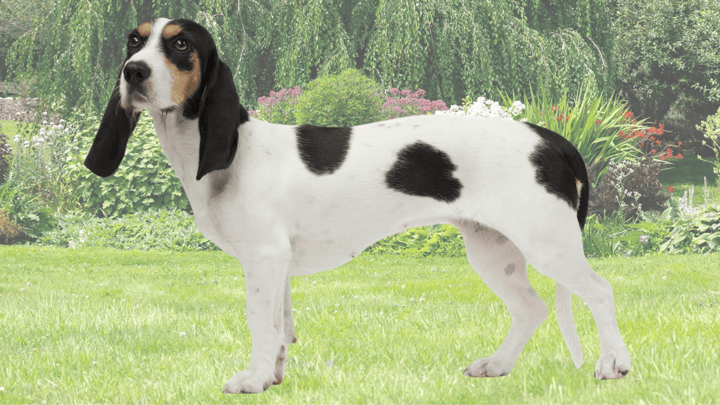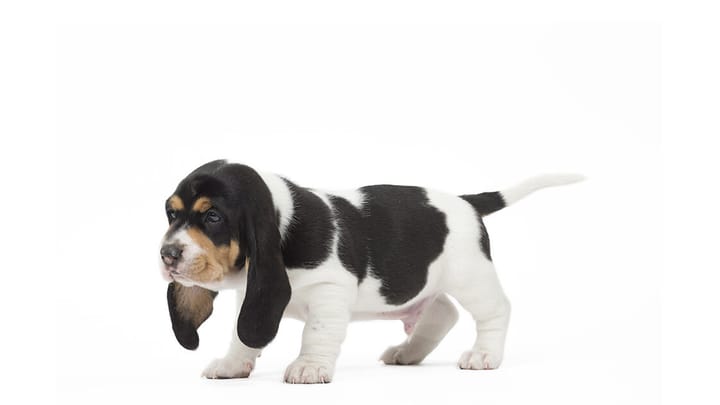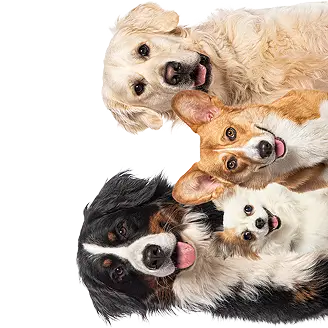Small Swiss Hound
Other names : Petit chien courant suisse, Schweizerischer Niederlaufhund


Lively, alert, bold and confident, the Small Swiss Hound is a classic example of a big dog in a small package. Originally bred for hunting, they have a fantastic sense of smell and are extremely active, holding a significant need for exercise.
They can be stubborn, determined and independent, so definitely need an experienced and firm hand. However, paired with the right owner, they’re loving, affectionate and loyal family pets who love a good cuddle.
|
Life expectancy |
The Small Swiss Hound has a life expectancy of between 12 and 14 years |
|
Temperament |
|
|
Size |
Medium
|
|
Adult size |
Female
Between 13 and 16 in
Male
Between 14 and 17 in
|
|
Adult weight |
Female
Between 22 and 44 lb
Male
Between 22 and 44 lb
|
|
Coat colour
The Small Swiss Hound normally has a white coat with tan or orange patches. Different varieties may also be black and tan, or blue and black. |
Black White Red |
|
Type of coat
This breed boasts an easy to care for, single, smooth coat. They often have slightly longer hair on the back and legs. |
Short Hard |
|
Eye colour
The Small Swiss Hound has very dark brown or black eyes. |
Brown
|
Adolph Hitler himself was once an owner to a Small Swiss Hound.
More details about the Small Swiss Hound
Small Swiss Hound: Origins and history
The Small Swiss Hound originates from a taller dog called the Swiss Hound and the well-known, super short Basset Hound. They were selectively bred for hunting private areas of land in Switzerland. They’re still used for hunting today and are rarely kept as a companion dog.
Physical characteristics of the Small Swiss Hound
This is a small breed - not in personality, just size! The body is long and rather rectangular looking. They’re short with a medium tail, straight back, broad chest and straight legs.
The Small Swiss Hound has a long head, wide, dark nostrils, oval, expressive eyes and a moderate stop. The ears are super floppy and rather cute, hanging down by the sides of the face.
FCI classification of the Small Swiss Hound
-
Group 6 - Scent hounds and related breeds
-
Section 1 : Scent hounds
Small Swiss Hound: Characteristics
Small Swiss Hound: Behaviour
Training a Small Swiss Hound
Sweet and docile, this little dog is very attached to his master and is therefore keen to make him happy: which greatly facilitates his education. The main priorities in training this dog are socialisation, and getting him to walk on the leash without trying to shoot off.
Small Swiss Hound: Lifestyle
Breed compatibility Small Swiss Hound
Small Swiss Hound: Purchase price
We do not have enough data to set an average price.
Looking after a dog of this size typically costs between £70 to £100 a month, including food, medical/insurance, and incidental expenses.
Small Swiss Hound: Shedding
Average
The Small Swiss Hound sheds minimally.
Small Swiss Hound: Grooming
One of the best things about the Small Swiss Hound is their easy-care coats. They’ll simply need a weekly brush and a few baths a year to keep in tip-top condition.
If they get dirty, a wipe down with a cloth is sufficient as too many baths can dry out their skin. It’s also important to check this breed’s ears regularly as food and dirt often get trapped.
Small Swiss Hound: Health
On average, the Small Swiss Hound lives for 13 years, but often lives longer.
Despite their fairly small size, the Small Swiss Hound is a fairly sturdy, strong and tough dog.
With its single, short coat, this breed will tolerate warmer weather. As always, though, they should still be given water and access to shade during hot spells.
The Small Swiss Hound is a hardy and resilient dog. However, their coat isn’t waterproof and doesn’t offer much protection, so they shouldn’t be kept outside in cold or wet weather.
If this breed gets the required amount of exercise, they’ll have no problem retaining a healthy weight.
- Ear infections
- Elbow dysplasia
- Hip dysplasia


